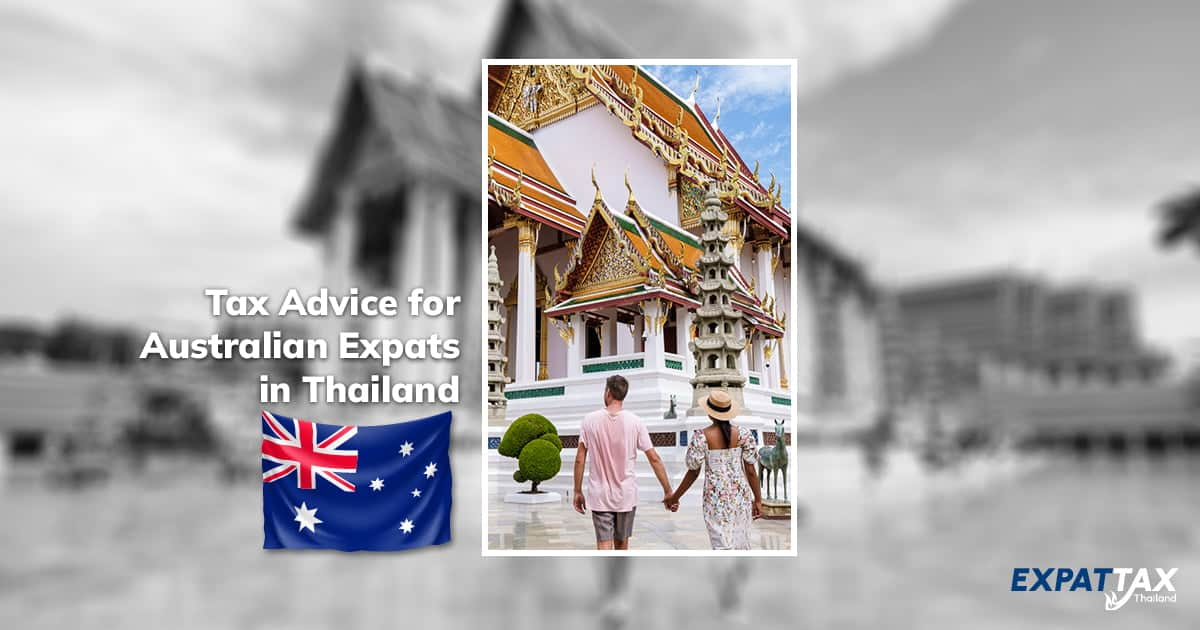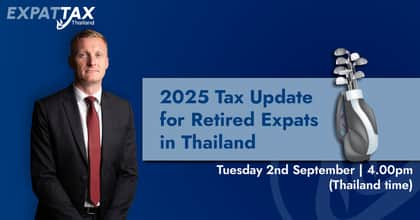
With over 20,000 Australians living in Thailand, the recent changes to Thailand’s tax laws have prompted many to reassess their tax arrangements. As of 1st January 2024, Thailand will tax foreign-sourced income remitted into the country by Thai tax residents. This shift means Australian expats must carefully plan their finances to avoid unexpected tax liabilities.
Understanding the interaction between the Australian and Thai tax systems, particularly under the Thailand-Australia Double Tax Agreement (DTA), is critical for managing tax obligations effectively. This comprehensive guide will help Australian expats navigate their tax responsibilities in both countries, covering essential topics such as tax residency, the remittance tax system, and how to avoid double taxation.
Tax Residency for Australian Expats in Thailand
Tax residency in Thailand is determined by the time you spend in the country within a calendar year. You are considered a Thai tax resident if you spend 180 days or more in Thailand between 1st January and 31st December. Importantly, your visa type does not affect your tax residency status. Whether on a retirement, marriage, or business visa, your residency is determined solely by time spent in Thailand.
For Thai tax residents, specific thresholds trigger the requirement to file a tax return. If you remit pension assessable income into Thailand exceeding THB 120,000 per year as an individual or THB 220,000 for married couples, you are required to file a Thai tax return. If it is other sources of income you remit, like dividends or rental property income, then the filing limits are halved.
Remittance Basis of Taxation in Thailand
Thailand operates on a remittance-based tax system, which means that only foreign-sourced income brought into the country is subject to taxation. Income earned abroad but kept outside of Thailand is not taxable. This system allows Australian expats to manage their tax liabilities by carefully planning how and when they remit income to Thailand.
A key aspect of this system is the treatment of income earned before 1st January 2024. Any income earned before this date is exempt from Thai taxation, even if remitted to Thailand after 2024. Australian expats with savings in the bank before 2024 can transfer these funds to Thailand without incurring Thai tax.
The timing of remittances plays a crucial role in managing your tax obligations. For example, if you earn income in Australia after 2024 and plan to remit it to Thailand, it will be taxable in the year it is brought into the country. However, if you strategically delay remittances or keep funds outside Thailand, you may be able to defer or minimise tax liabilities.
Managing when and how you remit income can offer substantial benefits. By being mindful of the timing, you can maximise tax efficiency and avoid unnecessary taxation.
Australian Tax Obligations for Australians Living in Thailand
Even if you become a Thai tax resident, Australian expats may still have obligations to lodge an Australian tax return. If you are considered a non-resident for tax purposes in Australia, you must report and pay taxes on any Australian-sourced income. While you may not be taxed on your worldwide income in Australia, certain income derived from Australian sources remains taxable.
Australian expats need to be aware of their ongoing tax obligations in Australia to avoid penalties. Additionally, expats should refer to the Thailand-Australia Double Tax Agreement (DTA), which provides relief options to avoid being taxed twice on the same income. The DTA allows using tax credits to offset taxes paid in one country against liabilities in another, helping you manage your tax responsibilities more effectively.
Australian Income Commonly Assessable in Thailand
Superannuation
Under the Double Taxation Agreement (DTA), superannuation payments are considered taxable in Thailand if remitted. While Australian civil service and military pensions are exempt from Thai taxation, superannuation remittances are classified as assessable income. Australian expats receiving superannuation should be aware that they will need to declare this income in Thailand and may owe taxes based on Thai tax rates.
Private Pensions and Annuities
Private pensions and annuities are also taxable in Thailand. However, Australian expats can claim tax relief under the DTA, allowing for credits against taxes already paid in Australia. This ensures that you are not taxed twice on the same pension income.
Capital Gains and Dividends
Capital gains from investments and dividends earned from Australian shares are subject to taxation in Thailand. However, any taxes paid in Australia on these gains or dividends can be used to offset your Thai tax liability through the DTA. This tax relief helps reduce the overall tax burden for expats with investment income in both countries.
Rental Income from Australian Property
Income earned from renting out property in Australia is taxable in Thailand, even though it may also be taxed in Australia. The DTA provides a mechanism to claim tax credits for the taxes paid in Australia, reducing or eliminating additional Thai tax liability. You also get Thai deductions of 30% and also other allowances, so it may be a filing and admin issue rather than a tax burden, especially if you are a non-Australian tax resident and if you have a high tax rate in Australia on the property rental income already. You still have to file, but can use the tax paid as a credit to offset the tax owed.
Property Sale Gains
Profits made from property sales in Australia are taxable in Thailand if you are a Thai tax resident. This can result in a significant tax obligation, so seeking professional advice before selling a property is highly recommended. Proper planning and understanding can help minimise tax liabilities on such transactions.
Thailand-Australia Double Tax Agreement (DTA)
The Thailand-Australia Double Tax Agreement (DTA) is a critical tool that helps Australian expats avoid being taxed twice on the same income in both countries. The DTA is designed to prevent double taxation by allowing tax credits to be applied to income taxed in one country and remitted to another.
How the DTA Works
The DTA allows Australian expats to claim tax relief by offsetting taxes already paid in Australia against their Thai tax liabilities. This ensures you aren’t taxed twice on the same income, such as superannuation, capital gains, or rental income. For example, if you have already paid taxes on rental income in Australia, you can apply a credit for that amount when calculating your Thai tax obligations.
Common Scenarios for Using the DTA
- Superannuation and Private Pensions: Superannuation is taxable in Thailand if remitted, but if taxes have already been paid in Australia, the DTA allows you to claim a tax credit, ensuring you aren’t taxed twice.
- Investment Income (Capital Gains and Dividends): If you’ve paid taxes on capital gains or dividends in Australia, you can apply for relief under the DTA to avoid additional Thai taxes on this income.
- Rental Income from Australian Property: Income from renting Australian property is taxable in Australia and Thailand. However, the DTA allows you to claim tax credits to offset your Thai tax liability.
Tax Credits Under the Australia-Thailand DTA
To claim tax credits under the DTA, you need to provide proof of the taxes you’ve paid in Australia, such as tax certificates or other official documents. These credits are applied against the taxes you owe in Thailand, reducing or eliminating additional tax liabilities. This can be especially beneficial for expats with complex tax situations involving income streams from both countries.
Professional Advice
While the DTA offers significant protection from double taxation, applying its provisions correctly can be complex. Everyone’s tax situation differs according to an individual’s circumstances, so seeking professional tax advice is highly recommended to ensure you are fully compliant and optimise your tax liabilities in Thailand and Australia.
If you want to discuss how the Australia-Thailand DTA impacts you, book a free call with our support team.
Watch Our Webinar – The Thailand-Australia DTA Explained

Filing a Tax Return in Thailand
Understanding the tax filing process is essential for Australian expats living in Thailand to ensure compliance with local tax regulations.
Here’s a step-by-step guide to help you navigate the Thai tax filing system:
Step-by-Step Tax Filing Process
- Deadlines:
The tax filing deadline for paper submissions is 31 March of the following year. However, if you file online, you have until 8 April to submit your tax return. - Forms to Use:
- PND 90: This form is used for individuals with income from various sources, including foreign-sourced income.
- PND 94: This form is used for mid-year tax filing (typically required if you have assessable income in the first half of the year).
Ensure you complete all the necessary documentation and forms before these deadlines to avoid late penalties.
Claiming Tax Credits for Australian Taxes
If you have already paid taxes on your Australian income, you can claim tax credits under the Double Taxation Agreement (DTA) to offset your Thai tax liability. To do this, you must provide proof of taxes paid in Australia, such as tax certificates or other official documentation from the Australian Taxation Office (ATO). These certificates are critical for ensuring you don’t get taxed twice on the same income.
Maintaining Clear Financial Records
Maintaining accurate and up-to-date financial records is crucial for Australian expats. You should keep thorough records of income earned abroad, taxes paid, and remittances made to Thailand. This helps streamline the tax filing process, ensures compliance with Thai tax laws, and enables you to claim any applicable tax credits easily.
Simplify Your Tax Filing with Our Online Portal
We understand that filing taxes as an expat can be challenging, especially when dealing with foreign income and tax credits. Our easy and secure online tax portal is designed to simplify the tax filing process for Australian expats in Thailand.
You can submit your returns and all required documentation electronically through our portal, making the process faster and more convenient. Whether you need basic filing assistance or have complex tax needs, our services can help ensure you meet all compliance requirements.
Common Reporting Standard (CRS) and Information Sharing
The Common Reporting Standard (CRS) is an international framework designed to promote tax transparency and prevent tax evasion by facilitating the automatic exchange of financial information between participating countries. Both Thailand and Australia are signatories to the CRS, which means that financial institutions in both countries are required to share specific information about account holders with their respective tax authorities.
Types of Financial Information Shared
Under the CRS, the following types of financial information are typically shared between Thailand and Australia:
- Account Balances: Information about the total amount held in bank accounts.
- Investment Income: Earnings from dividends, interest, and other forms of investment.
- Dividends: Income from shares or stock holdings.
- Proceeds from the Sale of Financial Assets: Details of profits from selling investments such as shares or bonds.
This information is automatically exchanged between the Australian Taxation Office (ATO) and Thailand’s Revenue Department, making it important for expats to ensure that their financial reporting in both countries is accurate and current..
Importance of Maintaining Compliance
Maintaining compliance with Thai and Australian tax regulations is crucial for Australian expats living in Thailand. Any discrepancies between your reported income and the information shared through the CRS could trigger audits, penalties, or additional scrutiny from tax authorities in either country.
To avoid these issues, ensure that you report all relevant income and financial details in both Thailand and Australia. Properly managing your financial reporting under the CRS framework will help you stay compliant and avoid potential complications.
Summing Up
Navigating the tax landscape as an Australian expat living in Thailand can be complex, with obligations in both countries and the added intricacies of Thailand’s remittance-based tax system. From determining your tax residency to understanding the implications of the Thailand-Australia Double Tax Agreement (DTA), managing your taxes effectively requires careful planning. Staying compliant with both Thai and Australian tax regulations while avoiding double taxation is crucial, and professional advice can help ensure that you meet your obligations and optimise your tax liabilities.
Tax Solutions for Australian Expats
At Expat Tax Thailand, we offer a range of tailored services to help you manage your tax obligations effectively and with ease:
- Free Consultation: Understanding your unique tax situation is key to finding solutions. Book a free consultation with our team to discuss how Thai and Australian tax regulations affect you and how to minimise your liabilities.
- Tax ID Services: The first step in filing taxes in Thailand is obtaining a Thai Tax Identification Number (TIN). You can obtain a TIN from your local Revenue office or we can manage this process on your behalf.
- Tax Filing Assistance: Filing taxes as an expat can be challenging, especially when dealing with foreign income and tax credits. Our team will guide you through filing, ensuring compliance with Thai and Australian tax laws.
- Easy, Secure Online Tax Portal: Our online tax portal simplifies the filing process. Submit your returns and documentation securely, ensuring that your filings are handled quickly and efficiently, all from the convenience of your home.
If you want to learn more about how we can help with your tax obligations, book a free call or explore our services at Expat Tax Thailand today.


